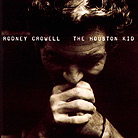May 2001
The Houston Kid has the ring of truth, rooted in precise detail. Crowell has supposedly been working on an autobiography, but the fact is that his songs have always had the deep resonance of personal experience grafted onto their stories -- from the absent father in "Ain't Living Long Like This" ("My daddy drove a stock car to an early death / All I remember is a drunk man's breath …") to the child watching his father beat his mother in Kid's "Topsy Turvy" ("Momma's on the pavement with a broken arm / Telling everybody that he meant no harm / Talk about denial with a great big D / You can try to fool the neighbors but you can't fool me"). But on The Houston Kid, Crowell has upped the ante and made his most personal record to date -- even if all of the songs aren't, strictly speaking, autobiographical. The album's opener, "Telephone Road," sets the stage with dramatic flair. To a hard-rocking beat, driven by electric and acoustic guitars (and with a Hammond organ burping along deep in the mix), Crowell sings: "Rain came down in endless sheets of thunder / Lightning bolts split trees down to the roots / In the shadow of the Astrodome with a hurricane coming on strong / We used to hit the streets and go swimming in our birthday suits / Skiing in a bar ditch behind a moped / Thirteen stitches on the corner of a sardine can / We were dirt poor Houston kids our whole family living on the skids/ But we always had a nickel for the coming of the ice cream man …" In song after song, Crowell lets the telling detail inform his character studies and stories. No, strictly speaking, The Houston Kid isn't Crowell's story -- to the best of my knowledge, he didn't go to jail for seven years, taking the rap for his mother's shooting of his father during a domestic dispute, as does the protagonist in "The Rock of My Soul." But when he sings "I'm a first hand witness to an age-old crime / A man who hits a woman isn't worth a dime / five, six, seven, eight, nine years old / That's what I remember about the rock of my soul …," it feels true. Other songs reveal his extraordinary empathy for his characters -- his ability to tell the truth even when making it all up -- such as the paired "I Wish It Would Rain," sung by an AIDS-infected street hustler, and "Wandering Boy," told from the hustler's brother's point of view, as he cares for his ravaged relative late in his illness ("I used to cast my judgments like a net / All those California gay boys deserve just what they get / Little did I know there would come a day / When my words would come back like a debt I have to pay …"). And then there are the songs which are not only true, but also happened, such as the album's brilliant centerpiece, "I Walk the Line (Revisited)," in which Crowell describes the moment he heard Johnny Cash on the radio and his life was changed forever. Cash, for a while Crowell's father-in-law, joins him on the song. "I'm back on board that '49 Ford in 1956 / Long before the sun came up way out in the sticks / The headlights showed a two-cut road way back up in the pines / First time I heard Johnny Cash sing 'I Walk the Line' … I never will forget that day and place … I've seen the Mona Lisa, I've heard Shakespeare read real fine / It's just like hearing Johnny Cash sing 'I Walk the Line.'" Best of all, the record rings as true as Crowell's memories -- it sounds sharp and precise with rip-roaring guitar tone, deep bass and natural drum sound. Crowell's reedy tenor isn't the strongest instrument in the world, but here it sounds like what it is -- an expressive, but not particularly refined voice. It's simply real. The Houston Kid has the sound of a hot band in a perfect hall -- and this is undoubtedly a side benefit of Crowell's going it alone, for it stands head and shoulders above any of the cookie-cutter, over-compressed "product" coming out of Nashville these days. Is it demonstration quality? Depends on whether or not you can handle the truth. It's going to be on the top of my must-play pile for a long, long time. Do yourself a favor and add it to yours. GO BACK TO: |
 Rodney Crowell - The Houston Kid
Rodney Crowell - The Houston Kid![[Reviewed on CD]](../format/regcd.gif) Despite
the fact that Rodney Crowell has been recording for over 20 years -- and never mind that
his 1988 Diamonds and Dirt coughed up a record-setting five hit country singles --
the state of contemporary country is so conservative that he had to finance The Houston
Kid himself to get it made. That's OK -- his music, like this record, owes nothing to
Nashville, Inc.
Despite
the fact that Rodney Crowell has been recording for over 20 years -- and never mind that
his 1988 Diamonds and Dirt coughed up a record-setting five hit country singles --
the state of contemporary country is so conservative that he had to finance The Houston
Kid himself to get it made. That's OK -- his music, like this record, owes nothing to
Nashville, Inc.